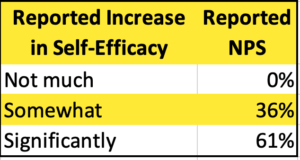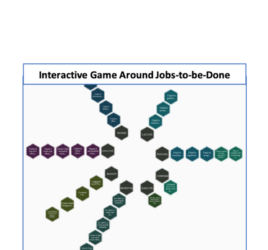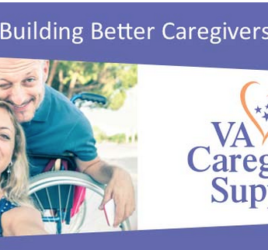
Adopting New Behaviors Doesn’t Need to Be All Work- It Can be Quite Satisfying
Individual behavior change is often central to enhancing quality of life and improving health. This includes adopting healthier habits around diet, physical activity, sleep, and other core individual behaviors. It includes new tactics to improve social interactions with family and friends and with healthcare providers. And it often includes new medical-related behaviors such as medication adherence. Inherent in behavior change is that someone needs to do something they haven’t currently been doing – and unfortunately many of the strategies to encourage this behavior change are not well liked by the individuals they aim to help.
It doesn’t have to be this way.
There is a way to increase a populations’ confidence while providing an experience which feels so good that people would gladly recommend it to others. Increasing an individual’s self-efficacy (the capacity and confidence to set and achieve goals that are personally meaningful) can accelerate behavior change. As we’ve discussed in previous articles, Canary Health’s Better Choices, Better Health® (BCBH) program provides a 6-week, digital, peer-to-peer workshop experience designed specifically to increase self-efficacy in a way that keeps participants engaged and recommending it to others. And as we’ve shared, the evidence convincingly demonstrates the program’s impact on accelerating behavior change. For example, see the results of the Anthem/Stanford study that showed improvements in physical activity and diet, and increases in medication adherence.
What I am excited to share in this article is that people actually like this approach to behavior change. We find that helping individuals determine what matters to them, and enabling them to build their confidence to achieve their goals, is a well-received approach to supporting behavior change. And I am happy to report that our data supports this – the more successful we are in helping a participant increase their self-efficacy, the more they like the program. Now to the data…
At Canary Health we regularly survey our participants to ensure we are increasing their self-efficacy, and we also survey their satisfaction with the program as measured by Net Promoter Score (NPS). The NPS measures a person’s willingness to recommend the program to a friend. We use a trailing three-month survey of each measure. In the results through the end of February 2019, 50% of participants report that BCBH significantly increases their confidence to manage their chronic condition(s), 31% report that it somewhat increases their confidence, and 19% reported little change in their confidence. BCBH’s overall Net Promoter Score (NPS) was 42 – a very respectable score. We’re very proud of these outcomes, and are continuously working hard on improvement.
We then stepped back and reviewed the correlation between the degree of self-efficacy and the individual NPS. As noted above, many common tactics used to support behavior change may actually decrease satisfaction. We were edified in our approach to see that there was a strong correlation between an individual’s higher self-efficacy and their higher NPS score – demonstrating that the BCBH paradigmatic approach to accelerating behavior change is effective. The table below shows the relationship.

As levels of self-efficacy – the capacity and confidence to set and achieve goals that are personally meaningful – increase, the higher the individual NPS score – the more apt they are to recommend the program to a friend, indicating the program was more satisfying. Programs that increase self-efficacy and accelerate behavior change are more likely to be enjoyed and appreciated by participants.


